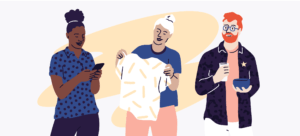Post-lockdown survey: 64% of Singles Prefer to Meet Future Partner in the Flesh vs Online (2019: 36%)
Concerns around online dating: fake profiles, ghosting, one night stands, superficiality // Dating events deemed ‘safer’ // New dating event formats include silent dating, dating in the dark, board game dating, and Lego dating // Creator of “Original Dating” sees 30% more people matching since 19 July
As the UK fully emerges from an isolating lockdown experience, a recent survey indicates that the pandemic has reignited face to face dating. When asked about how they’d like to meet a partner for the first time, 64% said that they’d prefer it to be in-person rather than online. That’s nearly twice as many as in pre-pandemic 2019, when a similar survey asked the same question and only 36% said they’d like to meet their future significant other in-person for the first time. It suggests that while swiping through dating apps may have been a blessing during lockdown, people are ready to get out and connect face-to-face once more.
The survey among UK singles, commissioned by ticketing and events platform Eventbrite in July 2021, also found that over a third had already been to dedicated dating events and while one in five had tried classic speed dating, more experimental singles had attended silent dating, dating in the dark, boardgame dating and Lego dating events. Almost one in ten had gone to a dating event that was specific to their religion or convictions.
Views on Online Dating
When asked about their thoughts on online dating, half of those questioned said there were too many fake profiles online and 49% said there were too many people looking for one-night stands. A further 40% admitted they found it very superficial to simply swipe right on looks alone, while 30% confessed that ghosting had been an issue. A further 28% thought people lied about their age online and 25% believed there were lots of married people on dating sites. On the flip side, some people found it a bit of fun (19%), exciting (11%) and efficient (6%).
When asked about dedicated dating events, 32% said they felt safer meeting someone in person than online, 31% admitted it took them out of their ‘comfort zone’ and 20% said it was fun and exciting to attend these events, even if they didn’t meet anyone they liked. A quarter thought it was more honest than online dating because what you see is what you get, while almost one in five preferred events because they could go there with friends.
While lockdown forced dating events go online – this February alone, Eventbrite issued almost 2,000 tickets to virtual dating events – there’s been an about turn to events where people can get to meet each other in the flesh again. In fact, nine out of ten dating events on Eventbrite that are scheduled for August and September are now face-to-face.
The ticket platform issued more than four times as many tickets to in-person dating events in July than it had in May, ranging from dating events aimed at different religions, ethnic groups, age groups and sexualities, and they include fun events such as Cards Against Humanity dating and Drunk Jenga dating.
London-based Original Dating, which organises speed dating events and singles parties throughout the UK via Eventbrite, has seen the popularity of its events explode ever since the UK opened up fully on 19 July and has found 30% more people are matching at its events too.
Original Dating Founder Andrew Summersgill said: “We started selling tickets for our dating events a few weeks ahead of opening up again and have never seen demand like this before – they’re selling out fast.
“We’ve added about 80 UK events to Eventbrite for the next three months and the appetite for them has been massive. Lockdown has been difficult for single people; they’ve been isolated and haven’t had much human contact in the last 16 months so they can’t wait to get back out there. It’s so encouraging to see this surge in demand and it’s been really interesting to find from our matching system that after lockdown, two thirds of people who came to an event made a connection with people they’d like to see again – that’s about 30% more than usual. It indicates just how much singles are ready to date again and have more human connection.”
Eventbrite’s Sebastian Boppert said: “Lockdown was hard on anyone trying to meet a partner and while there were many online events on our platform keeping people connected virtually, most people would clearly rather meet in person for the first time than over a screen. We have also noticed that ticket sales for in-person dating events on our platform are growing steadily. For many singles out there, this could finally be the summer of love they have been waiting for, and we’re glad that, in some small way, we can help make that happen for them.”
Jonathan Bradshaw, Behavioural Researcher and Speaker at meetology.com said: “When it comes to dating, it is interesting to see the increase in the desire to meet face-to-face again. Whilst some of this will, of course, be down to the inability to meet IRL over the last 18 months, behavioural science suggests there may be other benefits such as the need for connection, touch and access to non-verbal clues.”
Connect: Research suggests that being able to recognise and then attune (synchronise) our behaviours with others can help humans connect and is easier face-to-face than virtually (1).
Touch: Psychologists call the need for physical contact’ skin hunger’, and a handshake or hug has been shown to decrease stress, improve our mood and increase social cohesion (2), all of which could be useful on a date.
Friendliness: Meeting face-to-face can help us seem friendlier. Nonverbal cues – such as a smile, gesture, or glance – allow us to gauge the tone and context of a social encounter, but when this information is missing, we can perceive others as less friendly (3).
___
1: Face to Face: Relating in a Changed World, Psychology Today, May 2020
2: A Basic Human Behavior Has Been Upended By Covid-19. Inverse.com, May 22, 2020
3: Sadikaj, Gentiana, and D. S. Moskowitz. “I hear but I don’t see you: Interacting over phone reduces the accuracy of perceiving affiliation in the other.” Computers in Human Behavior 89 (2018): 140-147.



